ISLAMABAD: Pakistan’s major opposition parties on Tuesday urged the government to dispatch “multiparty delegations of parliamentarians” to key world capitals as special envoys to highlight human rights abuses in the disputed Kashmir region where a security clampdown and communications blackout was imposed almost two weeks ago.
On August 5, India removed the decades-old autonomy the Muslim-majority territory of Jammu and Kashmir enjoyed under the Indian constitution. The move blocks the territory’s right to frame its own laws, opens the door for residents of all parts to buy property and compete for government jobs and college spots, and has raised fears that the region will be flooded with outsiders.
Indian Prime Minister Narendra Modi’s surprise move has also increased tensions with arch rival Pakistan which lays claim to Kashmir and has accused India of human rights violations in the territory at the heart of more than 70 years of hostility between the two countries, both of whom have nuclear weapons.
Islamabad has recently been lobbying the United States, European countries and international bodies like the United Nations against India’s unilateral decision to strip Kashmir of its special status. In the past, UN Secretary-General Antonio Guterres has called on the two countries to refrain from any steps that could affect Jammu and Kashmir’s special status.
In Aug 2016, the last government of Prime Minister Nawaz Sharif had appointed 22 special envoys who traveled to key capitals to lobby for Indian-held Kashmir after deadly protests broke out over the killing of a popular freedom fighter, Burhan Wani, in a gunfight with Indian security forces.
“The government needs to dispatch special multiparty delegations to world capitals to tell the world about Indian human rights violations in Kashmir,” Taj Haider, senior leader of the opposition Pakistan Peoples Party, told Arab News.
Referring to a United Nations report this July that accused India of human rights violations in Kashmir and called for the formation of a commission of inquiry into the allegations, Haider too urged the government to push the UN on the inquiry body.
“The US and European countries are very sensitive to human rights abuses, and we need to put the case of Kashmiris effectively at the UN and other international forums,” Haider said.
Last week, the 15-member United Nations Security Council met behind closed doors at the request of China and Pakistan to discuss the Kashmir situation, but did not issue a statement after the United States, France and Germany objected. Such statements are agreed by consensus.
Senator Raja Zafarul Haq of the opposition Pakistan Muslim League-Nawaz party said the government should not have celebrated the UNSC’s session on Kashmir as “this was convened on the request of China and prorogued without giving any direction to resolve the decades-old dispute.”
“We cannot plead the case of our Kashmiri brothers effectively on international forums until we forge domestic political unity,” he told Arab News, urging the government to utilize all resources to internationalize the Kashmir dispute with the support of opposition parties.
Pakistan’s UN Ambassador Maleeha Lodhi has described her country’s push for last Friday’s Security Council meeting as “the first and not the last step.” She said it was the first time in more than 50 years that the council had taken up the issue.
“The fact that this meeting took place is testimony to the fact that this is an internationally recognized dispute,” Lodhi had told reporters. “The people of Jammu and Kashmir may be locked up ... but their voices were heard today at the United Nations.”
The Security Council adopted several resolutions in 1948 and in the 1950s on the dispute between India and Pakistan over the region, including one which says a plebiscite should be held to determine the future of mostly Muslim Kashmir. Another resolution also calls upon both sides to “refrain from making any statements and from doing or causing to be done or permitting any acts which might aggravate the situation.”
UN peacekeepers have been deployed since 1949 to observe a cease-fire between India and Pakistan in Jammu and Kashmir.
US President Donald Trump spoke to Modi and Pakistan Prime Minister Imran Khan on Monday urging them to reduce tensions over Kashmir. “A tough situation, but good conversations!” Trump said in a Twitter post after the calls.
Pakistani opposition urges government to send Kashmir envoys to lobby in key capitals
Pakistani opposition urges government to send Kashmir envoys to lobby in key capitals
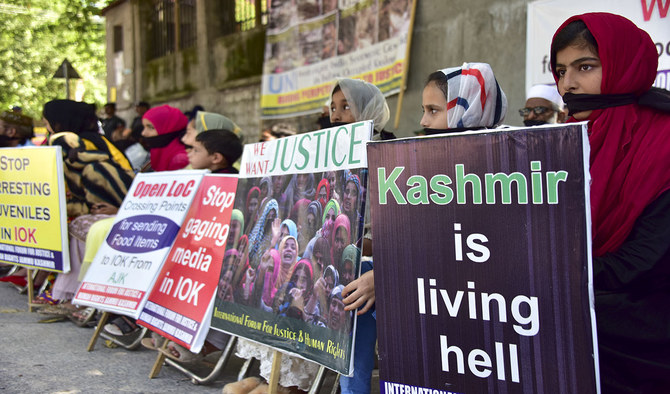
- Last government of Nawaz Sharif appointed 22 parliamentarians as special envoys on Kashmir in August 2016
- Pakistan is already lobbying the US, European countries and multilateral bodies since India revoked Kashmir's special status on Aug 5
Pakistan, Saudi Arabia and Uzbekistan ink ‘landmark’ agreement to promote trade, investment

- As per agreement, Uzbekistan’s largest bank and a Pakistani firm will support investors in all three countries
- Partnership to attract foreign investment particularly in key sectors of energy, infrastructure and agriculture
ISLAMABAD: Pakistan, Saudi Arabia and Uzbekistan have signed a “landmark” partnership agreement to boost economic cooperation and create new opportunities for investors in the region, Pakistan’s state-run television reported on Tuesday.
As per the terms of the agreement, Uzbekistan’s largest bank Ansher Capital will work closely with KASB Securities Limited (KASB), a leading Pakistani stock and commodity brokerage firm, to provide financial advisory and corporate finance services to investors in all three countries, the state media said.
Both firms will support investors and traders in Pakistan, Uzbekistan and Saudi Arabia by providing expert guidance on navigating financial markets, the Pakistan Television (PTV) said.
“In a significant development, Uzbekistan, Pakistan, and Saudi Arabia have signed a landmark partnership agreement aimed at promoting investment and trade between the three countries,” PTV said.
“The partnership is expected to expand the market and attract foreign investment, particularly in key sectors such as energy, infrastructure, and agriculture.”
The report said that the agreement is also expected to strengthen trade ties between the three countries, with a focus on increasing trade volumes and promoting economic integration.
“The partnership will enable businesses to tap into new markets and access new investment opportunities, creating jobs and driving economic growth,” PTV said.
Pakistan and Saudi Arabia enjoy strong trade, defense and cultural ties. The Kingdom is home to over 2.7 million Pakistani expatriates and serves as the top destination for remittances to the cash-strapped South Asian country.
Saudi Foreign Minister Prince Faisal bin Farhan arrived in Pakistan last week for a two-day visit aimed at strengthening bilateral economic cooperation and pushing forward previously agreed investment deals. Pakistan has said it pitched investment projects worth $30 billion to Riyadh during Prince Faisal’s visit.
Islamabad has sought trade and economic partnerships with bilateral partners and allies as it seeks to navigate a macroeconomic crisis that has seen its reserves plummet to historic lows and its currency weaken significantly.
Pakistan’s finance minister says new IMF loan agreement targeted for early July
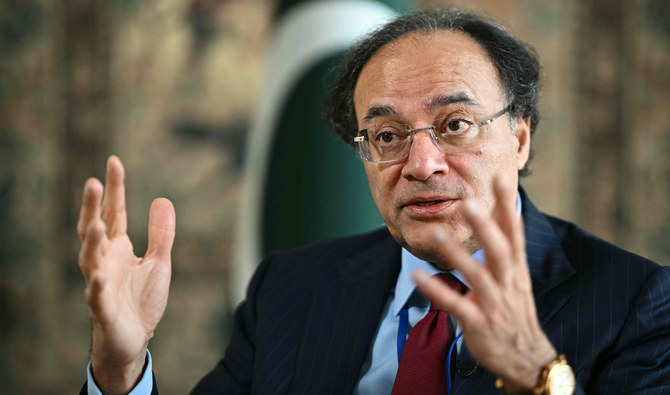
- The quantum and duration of new loan is still not clear, though the government wants at least a three-year program
- Muhammad Aurangzeb says the modalities of the new loan will be thrashed out with an IMF delegation next month
ISLAMABAD: Pakistan’s finance minister Muhammad Aurangzeb said on Tuesday the country planned to discuss the contours of a new loan program with an International Monetary Fund (IMF) delegation next month while hoping to reach a staff-level agreement with the global lender by early July.
Pakistan secured a $3 billion IMF bailout last year to avert a sovereign default and hopes to receive the final tranche later this month. However, the government wants a fresh IMF loan since the country continues to face tough economic challenges and plans to implement structural reforms.
“We are still hoping that we can get into a staff-level agreement by the time June is done or early July so that we can move on,” the finance minister said while addressing a news conference.
He informed he had had good discussions with IMF and World Bank officials during the spring meetings held by both international lending organizations in Washington.
Aurangzeb maintained it was not right to say that the IMF was imposing strict conditions on Pakistan since the country needed to carry out reforms on its own to strengthen its economy.
“This is Pakistan’s program which is helped, supported, assisted by the fund,” he said. “This is how we have to see it since this is the way ownership will come.”
He said the quantum and duration of the new IMF program was yet not clear, though the government wanted to secure at least a three-year loan package.
Both sides have said they were already in discussions for the new loan.
A formal request, however, will be made once the current facility expires, with the IMF board likely to meet late this month to approve the second and last tranche of the current support scheme.
The economy is expected to grow by 2.6 percent in the fiscal year 2024, the finance minister said, adding that the inflation was projected at 24 percent, down from 29.2 percent in fiscal 2023.
It touched a record high of 38 percent last May.
Aurangzeb said structural reforms would include increasing the government’s tax revenue-to-GDP ratio to 13 percent to 14 percent in the next two or three years from the current level of around 9 percent, reducing losses of state-owned enterprises through their privatization, and better management of the debt-laden energy sector.
With input from Reuters
Pakistan refiners warn $6 bln upgrades at risk due to fuel price deregulation plan
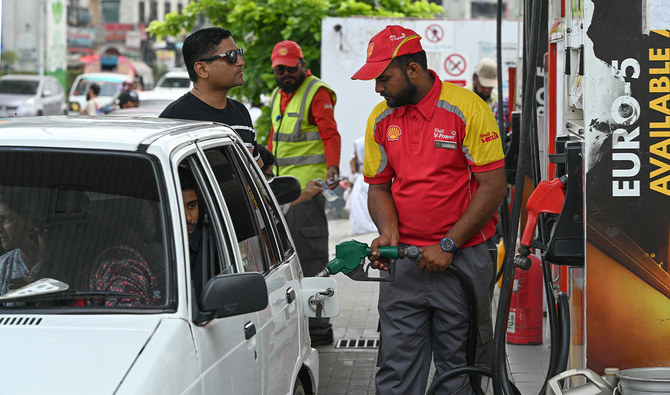
- Regulatory authority proposes oil marketers, refineries be allowed to set prices instead of government
- Refiners demand they be consulted before the implementation of “irrational recommendations”
KARACHI: Pakistan’s plans to deregulate fuel prices could lead refiners to halt planned upgrades worth up to $6 billion and force some refineries to close, some of the country’s top refiners said in a letter to the country’s oil regulator.
Looking to drive down prices for consumers, the South Asian nation’s Oil & Gas Regulatory Authority (OGRA) has proposed that oil marketers and refineries be allowed to set fuel prices, instead of the government setting prices.
As part of the change, OGRA proposed scrapping or reviewing a rule that requires fuel buyers to purchase supply from local refineries, another issue the refiners said could result in “disastrous consequences.”
The refiners — state-run Pakistan Refinery and private domestic refiners Pak Arab Refinery, Attock Refinery, Cinergyco, and National Refinery — said they were already struggling to operate near full capacity and asked that they be consulted before the implementation of “irrational recommendations.”
“The refining sector requires OGRA support through pragmatic and supportive measures, rather than suggesting ways that if implemented would result in their permanent closure,” the refiners told OGRA on Monday in a letter, which was reviewed by Reuters.
The deregulation was aimed at boosting competition and protecting the public interest, OGRA told Reuters in a statement on Tuesday, but did not respond to specific questions on the letter from the refiners. However, it said in an April 17 presentation reviewed by Reuters the potential impact of deregulation on refinery upgrades had to be assessed carefully, calling it a challenge.
“The refineries upgradation will bring in investment of $5 — 6 billion and not only result in cleaner environment friendly fuels but also result in savings of precious foreign exchange of the country,” the refiners wrote in the letter to OGRA.
Pakistan hopes to get new IMF loan by early July, says finance minister
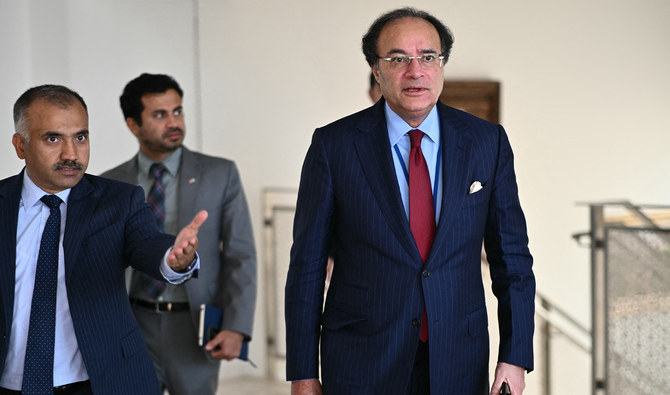
- Pakistan’s current $3 billion financial arrangement with IMF expires in late April
- Islamabad is seeking “bigger,” long-term loan to ensure macroeconomic stability
Pakistan is hoping to reach a staff-level agreement with the International Monetary Fund by June or early July, its finance minister said on Tuesday.
The country’s current $3 billion arrangement with the fund runs out in late-April, which it secured last summer to avert a sovereign default.
Islamabad is seeking a long-term bigger loan to help bring permanence to macroeconomic stability as well as an umbrella under which the country can execute structural reforms.
“We are still hoping that we get a staff-level agreement by June or early July,” Finance Minister Muhammad Aurangzeb told a conference in Islamabad.
He returned from Washington last week after leading a team to attend the IMF and World Bank’s spring meetings. “We had very good discussions in Washington,” he said.
He said he did not know at this stage the volume and tenure of the longer program.
Pakistan ‘rarely’ punished officials for rights abuses in 2023— State Department report
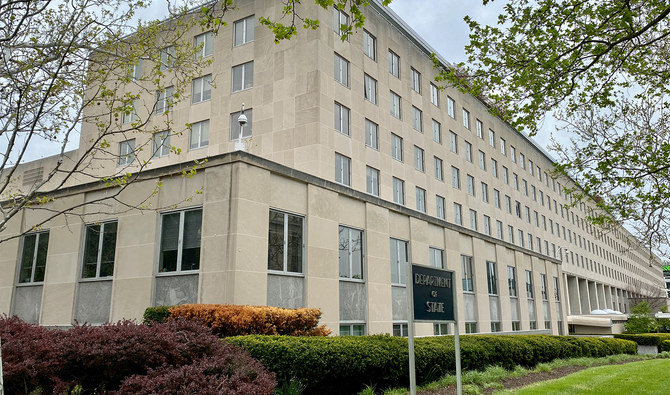
- US State Department releases annual “Country Reports on Human Rights Practices” for the year 2023
- Report says Pakistan witnessed extrajudicial killings, torture and restrictions on media freedoms last year
ISLAMABAD: Pakistan’s government “rarely” took steps to identify and punish officials who may have been involved in rights abuses in 2023, a report released by the US State Department said on Tuesday, pointing out incidents of extrajudicial killings, torture, enforced disappearances, violence against journalists and restrictions on media freedom had taken place in the country last year.
US Department of State released its annual “Country Reports on Human Rights Practices” to highlight rights issues in several countries, including Pakistan. In the report, Washington identified that Pakistan last year witnessed arbitrary killings, extrajudicial killings, enforced disappearance, torture and “cases of cruel, inhuman, or degrading treatment or punishment by the government or its agents.”
“The government rarely took credible steps to identify and punish officials who may have committed human rights abuses,” the report said.
Cases of “enforced disappearances” of citizens have long plagued Pakistan, where militants have waged a war against the state for decades. Families say people picked up by security forces often disappear for years, and are sometimes found dead, with no official explanation. Pakistani security agencies deny involvement in such disappearances.
The report also pointed out that last year Pakistan had seen incidents of restrictions on freedom of expression and media freedom, violence against journalists, unjustified arrests, disappearances of journalists, censorship and criminal defamation laws.
Pakistan’s recent actions to restrict Internet and mobile services throughout the country, especially on days when elections are held, have invited criticism from rights organizations and Washington. The interior ministry last week confirmed it had banned social media platform X in February to protect national security, maintain public order, and preserve the country’s “integrity.”
The State Department report further pointed out that rights issues in Pakistan during 2023 included extensive gender-based violence, including domestic or intimate partner violence, sexual violence, early, child and forced marriages. It said Pakistan had also reported incidents of female genital mutilation and crimes involving violence or threats of violence targeting members of religious, racial and ethnic minorities.
The report added that violence, abuse and social and religious intolerance by militant organizations and other non-state actors, both local and foreign, contributed to a culture of lawlessness in the country.
“Terrorist and cross-border militant attacks against civilians, soldiers, and police caused hundreds of casualties,” the report noted, crediting Pakistan’s military, police and other law enforcement agencies for carrying out “significant campaigns” against militants last year.
The South Asian country has seen an uptick in violence, mainly suicide attacks, since November 2022 when a fragile truce between militants and the state broke down. Pakistan has since then carried out military operations against the Pakistani Taliban or the Tehreek-e-Taliban Pakistan (TTP) and a Baloch separatist militant organization, the Balochistan Liberation Army (BLA) in the country’s two western provinces that border Afghanistan.










